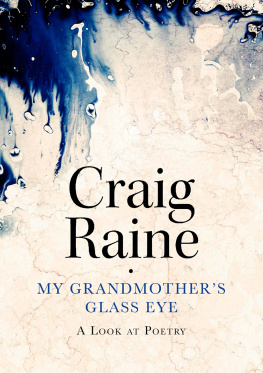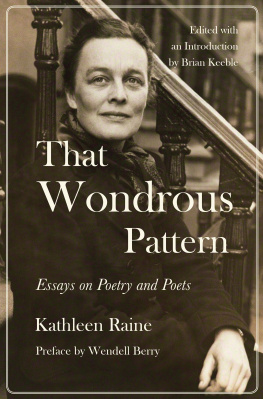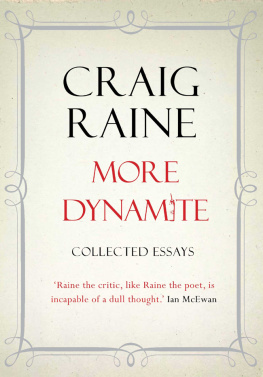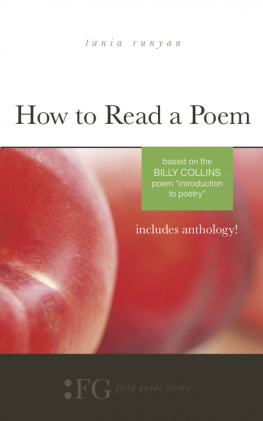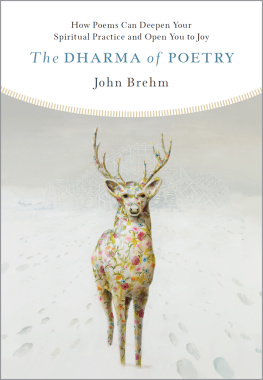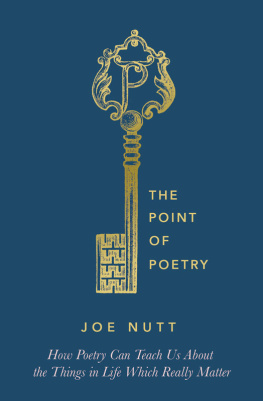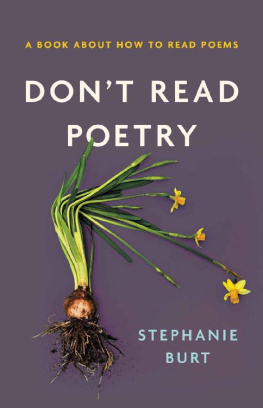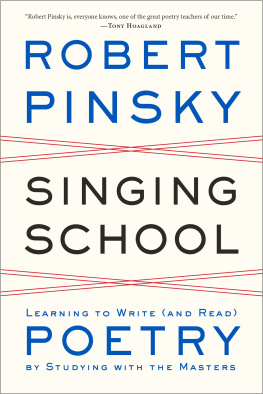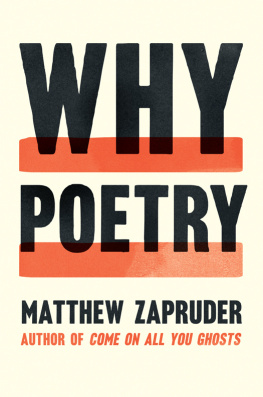MY GRANDMOTHERS GLASS EYE

A Look at Poetry
Craig Raine

Atlantic Books
London
For Milan and Vera Kundera
There was no one with more common sense, no stonecutter more obstinate, no manager more lucid or dangerous, than a poet.
GABRIEL GARCA MRQUEZ : Love in the Time of Cholera
Contents
At the Aldeburgh Poetry Festival in November 2013, I heard Ian McMillan deliver a very funny lecture on surrealist poetry and its unforeseen exotic charge of excitement to a young adolescent boy in Barnsley. McMillan remembered the buzz of a poem about an aeroplane that had propellers like bacon rashers and wings like reinforced lard. I come at the subject of poetry from the opposite direction. The poetry I like, that I prefer, makes sense either immediately or after extended reflection.
Of course, there are no absolute rules. We all know that feminine rhymes are intrinsically comic. Think of T. S. Eliots The Love Song of J. Alfred Prufrock: Should I, after tea and cakes and ices, / Have the strength to force the moment to its crisis? And yet there is Kiplings Harp Song of the Dane Women a grim poem of forsaking and threat where the feminine rhymes are in triplicate eight times, all the way through the poem: She [the sea] has no strong white arms to fold you, / But the ten-times-fingering weed to hold you / Out on the rocks where the tide has rolled you. Nothing could be more serious. So I know there are no absolute rules in poetry. Genius makes its own rules. But I would say that you have to know the (always provisional) rules in order to break them. I dont believe in accidental innovation. Poetry is, for me, a conscious art. It isnt spontaneous. It is artificial sometimes in the ways it pretends to be natural and spontaneous. It doesnt just happen.
When Bobby Kennedy came to the Oxford Union, a friend of mine stood next to him in the urinals and noticed he was wearing TV make-up. As far as Kennedy was concerned, he was on TV all the time and wanted to look as natural as possible. He will serve as a figure for poetry.
In this book, I examine poetrys relationship to music and the different ways in which music means and poetry means. Many of my examples, too, are taken from prose. Unapologetically. In The Guardian (25 January 2014) Adam Foulds, who is a poet and a novelist, observed that many people who used poetic as a criticism of the novel meaning over-written and over-sensitive displayed a not very accurate understanding of what good poetry is. I agree with his addendum: Great poetry such as William Wordsworths The Prelude is not poetic in that sense, in that it is full of the brilliant accuracies you find in good prose. Brilliant accuracies and intensity qualities shared by the best poetry and prose.
I am against poetry which is vague, pretentious and exaggerated. I am against neither difficult poetry nor pellucid poetry. But poetry has to be cogent in the end. Surrealism, for example, is a cogent strategy of incoherence. If you say propellers are like rashers of bacon, you know you are flouting sense. It isnt a complicated strategy, and its one with diminishing returns. However differently the finger is placed, the same button is pressed and no one answers the door.
And poetry is naturally various. Each poem should have a unique form whether it is written as a sonnet, quatrains, sestina, or any other given form. There is inevitably a secret formal agenda, a shared harmony, concord. Here are five fairly radical examples of what I mean. Christopher Reids poem A Whole School of Bourgeois Primitives, a description of a house and garden, is written in stripes the deckchairs, interference on the television, the cats pyjamas, jockeys silks. My poem A Martian Sends a Postcard Home has the form of a postcard: its observations are laconic and discrete; weather is a standard feature, a required field. Mist is when the sky is tired of flight, Rain is when the earth is television, are versions of the postcards statutory meteorology. James Fentons Lines for Translation into Any Language is about the everyday surrealism of war in Vietnam and it has the numbered form of an examination paper: 1. I saw that the shanty town had grown over the graves and that the crowd lived among the memorials. Diogenes lived, naked, in a barrel. Paul Muldoons [Diogenes] in Madoc is a trio of pseudo-barrels, a poem of Diogenes decorum: Sara puts her hand into a meal-ark; Southey lies in a claw-foot bath; and a snail mimics Diogenes in a barrel. A tongue-in-cheek snail goes meticulously / across a mattocks // blade-end. Less radically, Carol Ann Duffys Stuffed, a poem about a child molester and soft-toy maker, rhymes the same sound twelve times an aural index of the obsessive speaker. You can read the full text of these five poems, and others, in the appendix to this book.
My first chapters consider the word poetry when it is used unselfconsciously, without our thinking what it is. I want to examine our unexamined assumptions about poetry and correct them. Why do we wear ties? The answer may surprise you. To hide the buttons down our shirt fronts. As if the buttons themselves were naughty, halfway to nakedness, immodest. The aim of this book is modest. I want to show you poetrys buttons. I want to bare its devices.

Four Demonstrations
Must all be vaild, while he that reads, divines,
Catching the sense at two removes?
George Herbert: Jordan
I want to begin with two poems I like one easy to understand, the other notoriously difficult. The easy one first: Ted Hughess New Year exhilaration.
On the third day
Finds its proper weather. Pressure
Climbing and the hard blue sky
Scoured by gales. The worlds being
Swept clean. Twigs that cant cling
Go flying, last leaves ripped off
Bowl along roads like daring mice. Imagine
The new moon hightide sea under this
Rolling of air-weights. Exhilaration
Lashes everything. Windows flash,
White houses dazzle, fields glow red.
Seas pour in over the land, invisible maelstroms
Set the house-joints creaking. Every twig-end
Writes its circles and the earth
Is massaged with roots. The power of hills
Hold their bright faces in the wind-shine.
The hills are being honed. The river
Thunders like a factory, its weirs
Are tremendous engines. People
Walk precariously, the whole landscape
Is imperilled, like a tarpaulin
With the wind under it. It nearly
Blew me up the chymbley! And a laugh
Blows away like a hat.
We have no difficulty reading this poem. The wind has the force of an invisible sea. We can feel the surge of invention about halfway through. Sure, Every twig-end / Writes its circles captures the commotion observantly. But the genius is there in those roots massaging the earth, working the earth , the counter-intuitive comparison of the river to a factory, the roar of the weirs. And then the idea that the landscape itself might blow away, a comic, hyperbolic apocalypse, followed by the comic throw-away end the laugh and the hat. That surge is the exhilaration of the title.
Sylvia Plaths Ariel is, by contrast, a difficult poem. The note by Ted Hughes, in Plaths Collected Poems , informs us Ariel was a horse she rode in Devon. It seems a simple enough fact. But the name Ariel is dense with connotation, explosive with implication. The literal is quickly eroded. Most readers will think first of the spirit in Shakespeares The Tempest , a creature the opposite of the grossly corporeal Caliban. This fits a gallop in which the rider sheds her body: White / Godiva, I unpeel But there is more. The title, Ariel, the OED tells us, is the name given to Jerusalem in the Old Testament. It means the lion of god. The Larousse Encyclopedia supplies another sacred lion. In Babylonian-Assyrian mythology, Ishtar is the goddess of morning and evening, of love and war. As goddess of battles she is frequently depicted riding her sacred animal, the lion.
Next page
